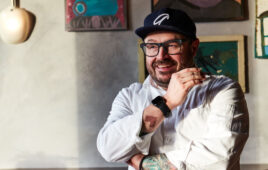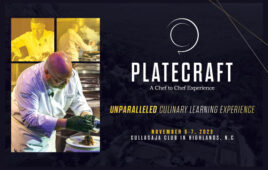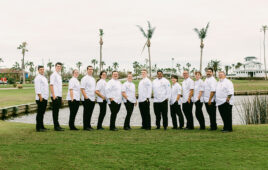Executive Chef Shelley Cooper of Belfair Country Club in Bluffton, S.C. has come back to her roots-and a setting where she can combine her experiences as an upscale restaurant and pastry chef with her childhood members of a classic, fresh-and-from-scratch Southern cuisine.
Shelley Cooper came to Belfair Country Club, in Bluffton, S.C., last November to be its new Executive Chef overseeing food and beverage operations for the 850 members of this very exclusive private community. Shelley brought extensive experience as a restaurant chef, and also as a pastry chef, to her new position. She hosted major fundraisers at her restaurant, 30 Degree Blue, in Panama City, Fla. to support St. Jude Children’s Research Hospital. She also spent one year as a consulting chef at a vineyard in New Zealand.
|
Shelley Cooper
CHEF PROFILE Current Position:Executive Chef, Belfair Country Club, Bluffton, S.C.
|
While Belfair CC has only been in existence for nine years, it sits on a property that was first established as a country estate and working plantation in 1811. The long “Avenue of the Oaks” that now marks the entrance to the club is a well-known landmark that has been used as a backdrop in television commercials for automobiles. The oaks were planted in the 1920s and now, at full maturity, frame a breathtaking drive.
We were glad to be able to spend some time with Shelley and hear how such an accomplished and experienced chef has begun to transfer her talents to the club industry.
Q Chef, how have your years of working in restaurants helped you as you’ve transitioned to the private club industry?
A I would have to say that the vastness of all the experiences I’ve had in many different venues would be the greatest contributor. The private club setting is proving to be no different than restaurants in that being well-rounded as a chef and manager—and sometimes also tapping into what I learned from my original study of psychology, before shifting to a culinary career—continue to be essential for successfully meeting all of the requirements and demands of guests and staff. Having all of this varied experience also helps me manage the unforeseen issues of this business, which are ever-present.
Q How about the strong pastry skills that you possess—how have you integrated these into your a la carte menus?
A Presently, I use a sourdough starter that I created when I arrived last fall. At one time, we had three starters going—rye, wheat, and white. But that’s proving to be a bit much to keep up with right now. As soon as I have a fully stocked crew, that will allow me more time to spend playing with the breads and pastries, and I cannot wait for that day to arrive.
 Q How has the staff adapted to your management and cooking style?
Q How has the staff adapted to your management and cooking style?
A I am now into my seventh month at this property, and a whopping four of the same staff members are still here with me. Two of the four are original club employees who have been here from the inception of the club nine years ago. Some of the other staff left on their own choosing, and some by my choosing. So yes, I have definitely seen significant turnover since my arrival.
Initially, it was a shock for both staff and me, as I am very involved with the food and believe strongly in scratch-made cooking. That is how I was raised and it is what I have spent my life searching to learn more about. So as part of that, it is necessary to have daily lineups with both the front and back staff doing tasting and training, and also to have strict cleaning and organizational guidelines.
It was different for the staff to see a chef who was so hands-on and involved, and this caused some initial “what’s next” doubt and uncertainty. But as time passed and they saw not only my commitment but the positive results that came out of all the changes, the level of trust grew and they got more comfortable with me, and vice versa. They ask more questions now and they say that they are learning, and that feels really good.
Q Can you explain how your “local first” philosophy works as it pertains to buying from the local farmers market and fishmonger—and even the Belfair employee who will grow anything you want him to?
A Living in the coastal South is the best! We have a year-round growing season and great access to fresh fish. I was raised on farm-fresh ingredients and have adhered to this philosophy my entire life, both personally and professionally. Living in the South allows me to have access to these fresh ingredients through local vendors.
Currently I work with a gentleman who has a family farm just south of Belfair. In the early spring he brought me baby collard greens and is currently getting me fresh tomatoes, peppers and cucumbers, as well as planning what he can grow for me in the next planting season.
My fishmonger is also great; he is in Charleston, and I used to buy from him when I was a student at Johnson and Wales. He is also good about keeping me informed and it is awesome to work with people who understand and agree with my food ethics.
This summer, our Thursday night theme will be the “Bluffton Farmers Market Buffet,” where we will get all products from the local farmers market that runs every Thursday, and base that night’s meal on what’s available that day at the market. We expect it to be a lot of spontaneous fun.
Q You mentioned the emphasis that your parents, who came from very different parts of the South, placed on having fresh, seasonal and made-from-scratch foods while you were growing up. How did this affect your career choice and help you to excel in the food industry?
A I actually didn’t set out to be a chef—I went to a Southern boarding school that only emphasized going off to a university and then pursuing a “normal” nine-to-five career. But while waiting tables while attending Christian Brothers University to pursue a degree in psychology, the restaurant’s executive chef, a CIA alumnus, kept reprimanding me for spending too much time and energy being excited about what was cooking in the kitchen, rather than tending to the customers’ needs. Eventually he suggested that I seriously consider culinary school, so I decided to attend Johnson and Wales.
While I was there, I realized how much I was affected by my culinary heritage. Things that were second-nature to me about product quality seemed to be something that other students were just learning for the first time. The awakening that everybody in the world had not always eaten fresh food gave me a whole new appreciation for the manner in which I was raised and the food experiences that I had been privileged to be exposed to.
Q Finally, Shelley, from your experiences, what would you say to any woman who’s aspiring to become an executive chef and make an impact in the club and resort industry?
A Be prepared for a life full of challenges—and know that to succeed, you must embrace those challenges and the victories that you have when meeting them. You must have guts, courage, and sheer determination, and be absolutely passionate about food and beverage hospitality. If these things are present, you will make an impact.





